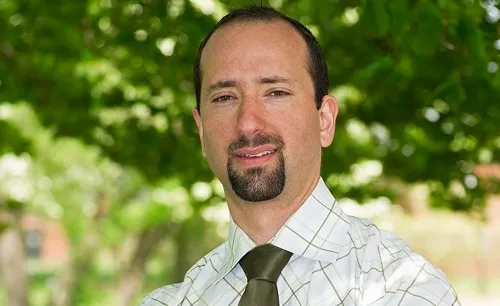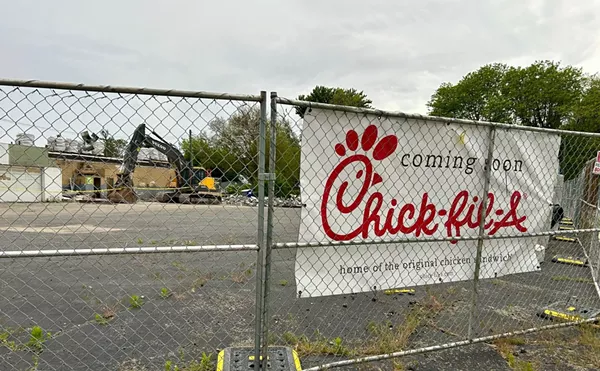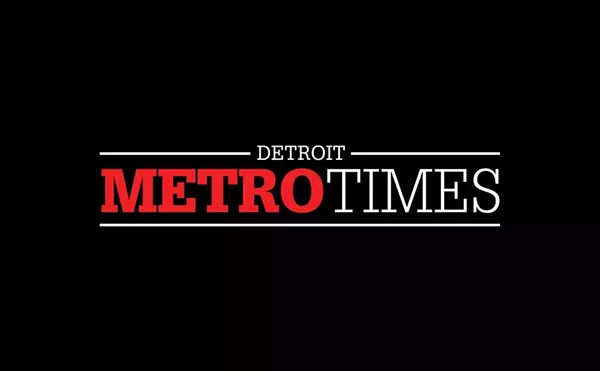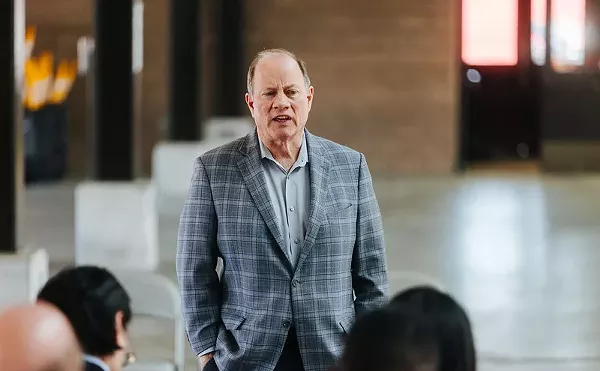
Audio By Carbonatix
[
{
"name": "GPT - Leaderboard - Inline - Content",
"component": "35519556",
"insertPoint": "5th",
"startingPoint": "3",
"requiredCountToDisplay": "3",
"maxInsertions": 100,
"adList": [
{
"adPreset": "LeaderboardInline"
}
]
}
]

MT file photo
Detroit City Councilmember Gabe Leland before his narrow District 7 win in 2013.
Detroit City Councilman Gabe Leland is being accused of having demanded that a constituent donate $15,000 to his campaign last year in an exchange for a favor.
According to a lawsuit filed yesterday in federal court, Leland agreed to help a Detroit business owner involved in a property dispute with the city in exchange for the donation. Hesitant to go along with the plan, business owner Bob Carmack says he approached the FBI, which instructed him to wear a wire as he handed off an envelope with a portion of the cash to a woman apparently associated with Leland's campaign.
Days later, the suit says, Leland told Carmack he'd received the $7,500 in cash, then asked him to fix his secretary’s car for free. Carmack obliged, saying he was told to do so by the FBI.
Leland never made good on his promise to help Carmack with his property on Michigan Avenue, the suit says. A few weeks later, through his role as head of council's Planning and Economic Development Committee, Leland allegedly put the sale of Carmack's property on the council agenda.
A call to Leland's office Thursday morning was not immediately returned.
A spokesman for the FBI would not comment on the case.
Leland was re-elected in November to his second term as District 7 councilman. This is the third scandal he's faced in a year's time. In late 2017, he was listed by the FBI as a "target subject" in a federal corruption probe having to do with his
The extortion claim is just one of the allegations outlined in the suit, which also lists as defendants the city, the Detroit Land Bank Authority, Detroit Mayor Mike Duggan, and Wayne County Treasurer Eric Sabree.
Carmack is also seeking at least $1 million in damages on a claim that Duggan retaliated against him for trying to fight the city on a separate land dispute. He says his business on Michigan Avenue was targeted because he went before the Detroit City Council to complain of "possible unlawful and illegal activity" surrounding the city's pending sale of another property near the riverfront.
Carmack's Michigan Avenue business was targeted for emergency demolition by the city in 2016. Carmack says in the suit that the demolition was unlawful because he was the owner, but the city says it came to own the property after it was tax-foreclosed in 2010. Blight issues warranted its teardown, the city said in a statement Thursday, but Carmack's suit says a Land Bank official was surprised by the expedited plans for a commercial teardown, saying Carmack must have "angered someone high-up at city hall."
"According to Mr. Haskins [an official with Defendant Detroit Land Bank Authority], he had never previously turned off the heat, water, gas, and electricity in a privately-owned property in one day. Nor, he added, had he ever been requested to have a commercial building demolished in one day," the suit says.
In a statement, the city maintained that the 2016 teardown of the property once owned by Carmack was legal.
"Now, two years later, he files this lawsuit because he could not get special treatment from the administration in his effort to reclaim the property he had lost through a legal process," Corporation Counsel Lawrence Garcia said.
He added, "We believe the claims against the administration are frivolous and we will be defending them vigorously."
A 2016 report on the demolition by WXYZ depicted neighboring buildings in
Carmack alleges the city took further action against him by canceling plans for him to fix its police cars.
"It is evident that the Defendants City and Duggan retaliated against the
Plaintiff for exercising his First Amendment Right to free speech during
the March 2015 City Council meeting, as well as for Plaintiff exercising
his First Amendment Right to free speech during the Channel 7 story," the suit says.






